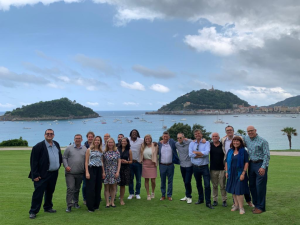Artículo publicado en NOTICIAS DE GIPUZKOA el 06/05/2015
Although his professional work is in the area of culture, his passions have been and remain international and American politics. Engaged in a research project in which he analyzes Basque foreign policy in relation to the United States, his academic training is broad and diverse: philology, linguistics, political science, law, and communication. He has extensive experience in public administration and politics, where he has held various responsibilities. An admirer of the American nation, Boise, along with Oñati and Donostia, is one is his most important vital references. A believer in Europe, and not therefore less critical, he wishes that both settings would complement each other in a more effective manner. The possibilities are endless for mutual enrichment.
From the moment I entered the San Telmo Museum, I recognized the vitality transmitted by Judge Elizabeth S. Stong. Honestly, I did not expect anything less. A resident of Brooklyn, she exudes character and also grants a different perspective of life. She reminded us in her intervention: each new dawn is found with new nationals arriving from known and lesser-known corners of the five continents seeking, above all, a second chance in life. A second chance that guides the spirit of political will, as embodied in the U.S. Constitution, which aims to alleviate the damage caused by unwanted events, decisions and circumstances. And above all, therein prevails a clear determination to find solutions to avoid foreclosures and bankruptcies. Without people there is no political or social project worthwhile. There is no greater patriotism than to empathize with your fellow citizens, with those who are and with those who pretend to be.
Accordingly, infinite empathy before the realities that surround us; empathy for realities that are a part of the American heritage, its genes, its approach to life, realities to which no American citizen is foreign, their ancestors having been through the same, allows Judge Elizabeth S. Stong to step into the shoes of newcomers to Brooklyn.
We alluded to the determination when facing problems of using the solution as indispensably forming the route. What would have become of Detroit or the auto industry if President Obama had waited to resolve complex analysis and political calculations? Or, if he had placed all his hopes within the strict rigidity provided in legal texts?
Obama acted, as any President would have, so as to make decisions that needed utmost determination and above all demanded to the leave the doubts for another time. Obama behaved in a way distinct to the American nation. And Judge Stong, no less, follows the same American trail.
Faced with determination, in Europe processes are eternal, no solutions in sight, and always from a misinterpretation of rigor, we instead take refuge in the hackneyed argument of legal impossibility and the classic lack of legal uniformity. Europe has a copious amount of tradition, a weapon of moral superiority to a country of little historical base, yet Europe lacks freshness, that which allows problems to be resolved quicker on the other side of the Atlantic. We have too heavy baggage to be effective, lacking light. But fundamentally, what we lack is the empathy embodied by Judge Stong to understand the reasons for the daily arrival of new people to Brooklyn, people seeking a new opportunity to rebuild their lives, to restructure their projects that in their hometowns could not come to fruition. For those there will always be the United States. In Europe, however, the arrival of those who yearn for a second opportunity is irritating, the take on which is a problem Europe is showing so little decisiveness on that it has led the Italian Prime Minister Matteo Renzi to implore the help of President Obama to employ his controversial drones. History repeats itself. In any case, in Brooklyn a new arrival, rather than being seen as a mess or a headache, is greeted with gratitude that expands the horizons and the strength of the undeniable diversity of American society. While in Europe, discomfort and social laziness delay the necessary rejuvenation of an aging society. But the worst thing is that we are also very remiss to our fellow citizens, those companies and individuals who have not fulfilled their expectations and that we thus deny their daily bread. Our history weighs down upon us, we know ourselves too well, and the setting is not the most conducive to overcome inertia. So hackneyed and polluted, the blockade is almost permanent. And so, from the lack of freshness and innovative human input, we continue wielding outdated, rigid, and inadaptable situations and scenarios.
I would not refute those who defend the benefits of the European project, its potential and its virtues. There is no shortage of conditions and premises, which at least on paper, are ideal. But without soul or heart, the adventure is doomed for failure and everything will continue to revolve around a utopia that never materializes, the Peter Pan who refuses to grow up. Perhaps it is a lesser evil, but it is one that is unable to ensure our second chances. Wallowing in failure and assuming fatalism is the formula that keeps us distant from Europe when it would rather do good to understand that the profits from more or less successful pasts increasingly contribute to our descent and that what is needed is to offer the possibility of getting up again or as many times as necessary. We lack many things of Brooklyn and, above all, we need the good humor and joy of Judge Stong.



